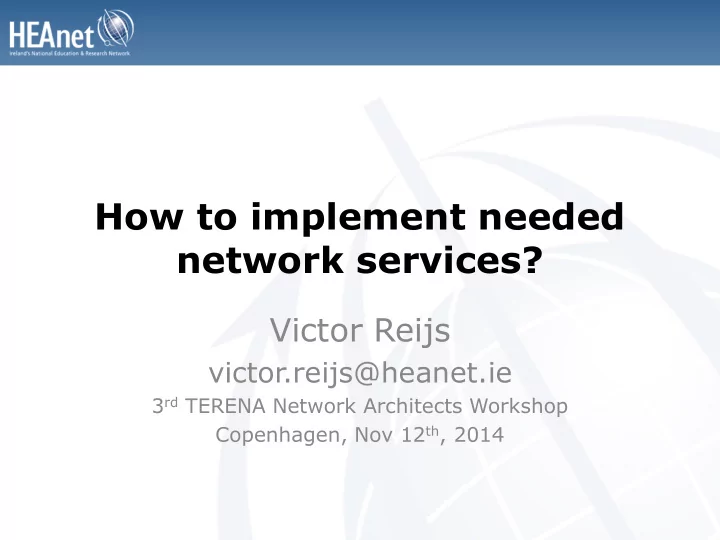

How to implement needed network services? Victor Reijs victor.reijs@heanet.ie 3 rd TERENA Network Architects Workshop Copenhagen, Nov 12 th , 2014
Content
Changing NREN environment • NREN are not (anymore) determining the e-communication developments, examples: e-Infrastructure, social media. • The public IP cloud has increasing its SLS • Don’t forget there is still a need for technology driven services as in past: identity federation, etc. • NREN services, their costs and SLSs need to stay the most economical advantageous solution. • Clients want more business driven instead of technology driven services...
Changing campus environment • Less money, less skills • Less time for new technologies • More trust needed from the NREN • NREN getting involved in the LAN environment
LAN WAN • Clients are getting more spread: due to mergers • Client want L2/L3/VOIP resilience not only to ‘main’ sites but also satellite sites • More and more devices: BYOD, Internet of Things • Move from L2 to L3 intra-institute connections... • Move from wired to wireless...
A campus network
Connectivity environment
Moving access around
Unique devices on a campus
WAN LAN • Are Fibre Channel and VxLAN type technologies important for NREN? • How to use these LAN protocols for WAN environments? • Network Function Virtualisation (firewalls, load-balancers, IPv4v6 interconnection, etc.) • Providing sandbox/staging facilities • Need for L2 and L3 VPNs • Disaster recovery, e-Infrastructure, off-site hosting...
Connectivity environment
Moving services around
Service locations • Will mobile be build/managed by institute, NREN or providers? • Will e-Infrastructure, VLE, MIS and storage be build/managed by institute, NREN(s) or providers? • What is ahead? Link up with innovative users
Changing traffic flows • Internal/external traffic change: – Present/past rule: 80/20 – In coming years: 50/50 to 20/80... • A certain transition of traffic from: – wired to wireless network – IP to L2VPN network • Yearly traffic growth on: – IP network (around 2 PByte/month)... • Fixed IP traffic ~0.35 AGR • 3G IP traffic ~0.45 AGR – P2P traffic assumed to be comparable to IP traffic • Change to L2 VPNs • Number of P2P links increases over time...
Client with services in HEAnet DC 95 th 71Mbit/s average 23Mbit/s 95 th 934Mbit/s 95 th 581Mbit/s average 332Mbit/s average 229Mbit/s
Changing traffic flows • Internal/external traffic change: – Present/past rule: 80/20 – In coming years: 50/50 to 20/80... • A certain transition of traffic from: – wired to wireless network – IP to L2VPN network • Yearly traffic growth on: – IP network (around 2 PByte/month)... • Fixed IP traffic ~0.35 AGR • 3G IP traffic ~0.45 AGR – P2P traffic assumed to be comparable to IP traffic • Change to L2 VPNs • Number of P2P links increases over time...
HEAnet’s aggregated IP traffic
Individual 3G IP traffic
Changing traffic flows • Internal/external traffic change: – Present/past rule: 80/20 – In coming years: 50/50 to 20/80... • A certain transition of traffic from: – wired to wireless network – IP to L2VPN network • Yearly traffic growth on: – IP network (around 2 PByte/month)... • Fixed IP traffic ~0.35 AGR • 3G IP traffic ~0.45 AGR – P2P network: • P2P traffic assumed to be comparable to IP traffic • Change to L2 VPNs • Number of P2P links increases over time...
P2Ps in HEAnet
Need for a new network • Integration of two network levels (L2 and L3) into one -> reduced site and service disturbance • Meet the ever-increasing traffic throughput demands • Ability to deliver new services aimed at improving intra-campus connectivity and mergers • Bring the benefits of upcoming network futures to client premises in terms of virtualization and NaaS/SDN for e-Infrastructure and shared services • Reduced carbon footprint • Should we wait until...?
Current and proposed architecture Reduced carbon footprint Current Proposed Virtualisation Number of devices 260 180 Client facing interfaces 315 140 Operation tools 10 6 Current Services 1 + 2 5 IP/CPE IP/CPE IP/CPE Proposed L2/MPLS L2/MPLS New New L2/MPLS New Optical Optical Optical Optical Optical Optical
Benefits More capacity Client Client Upcoming e-Infrastructure Flexible and consolidation Client Client Client New New New New Client Client Client L3VPN IPv4/6 Unicast and Multicast L2VPN Transparent Ethernet and incl. P2P NaaS/SDN: OpenFlow services Client
Network e-Infrastructure • Virtualisation stimulates: – Clouds and Infrastructure as a Service (IaaS) providing IT services; this is based on Platform as a Service (PaaS) and Software as a Service (SaaS) – Network as a Service and SDN are evolving, and NREN environment has some initiatives (like GN3plus and GN4). • The combination is logical step
Why NaaS/SDN? • IP cloud • On-demand self-service • Broad network access • Resource pooling • Rapid elasticity • Measured service
Increasing cooperation between clients and NREN • Has to be both ways: teaching & learning • Mutual secondment • Active involvement in strategic/tactical planning • Webinars by and for the clients • Best practise documents around common issues: such as Wi-Fi, campus networks, e-Infrastructure setups, strategic plans, etc. • Provide advice on how to include wide area trends • Prepare/inform for service changes in more holistic way
Summary • Virtualisation and related off-site trends • Boundary LAN WAN is dissolving/changing • New methods of networking need to be implemented • Integrate network and e-Infrastructure properly • More open, more connected, more sharing, more opportunities • Keep teaching & learning: clients and peers
Questions Li f / v e of f
Glossary Abbreviation AGR Annual Growth Rate FC Fibre Channel IaaS Infrastructure as a Service IP Internet Protocol MIS Management Information System NaaS Network as a Service NREN National Research and Education Network PaaS Platform as a Service P2P Point-to-point Peta ( 10 15 ) Byte PByte SaaS Software as a Service SLS Service Level Specification VLE Virtual Learning Environment VxLAN Virtual Extensible LAN Li f / v e of f
Recommend
More recommend